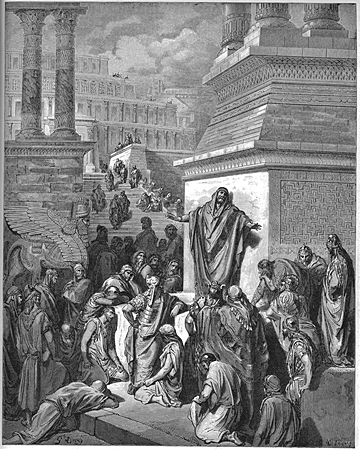Jonah 3
1 Then Yahweh said to Jonah again,
Mgbe ahụ, okwu Onyenwe anyị ruru Jona ntị nke ugboro abụọ na-asị,
2 “Go to that great city of Nineveh, and tell them the message that I gave you [previously].”
“Bilie, jee nʼobodo ukwu ahụ bụ Ninive, kwusaara ya ozi ahụ m ziri gị.”
3 So [this time] Jonah obeyed Yahweh, and he went to Nineveh. That city was so big that a person [had to walk] for three days to completely [go through] it.
Jona biliri gaa Ninive dịka okwu nke Onyenwe anyị si dị. Ninive bụ nnọọ obodo dị ukwuu, nke ga-ewe ụbọchị atọ ịga ya gburugburu.
4 On the first day [after] Jonah [arrived], he [began walking] through the city. He was proclaiming (OR, At the end of that day he started proclaiming) to the people, “Forty days from now, Nineveh will be destroyed {[God] will destroy Nineveh}!”
Jona malitere ịba nʼobodo ahụ, ma mgbe ọ gara ije otu ụbọchị, o kwusara sị, “Iri ụbọchị anọ ka ọ fọdụrụ tupu alaa Ninive nʼiyi.”
5 The people of Nineveh believed God’s [message]. They [all] decided that everyone should begin (fasting/abstaining from food). So [everyone], including important people and unimportant people, [did that]. They [also] put on coarse cloth, [to show that they were sorry for having sinned].
Ndị Ninive kwenyeere na Chineke, kpọsaa obubu ọnụ, ha niile site nʼonye ukwu ruo nʼonye nta, onye ọbụla yikwasịrị uwe mkpe.
6 The King of Nineveh heard [what the people were doing]. [So] he took off his royal robes, and [he also] put on coarse cloth. He left his palace, and sat down where there were [cold] ashes, [to show that he also was sorry for having sinned].
Mgbe akụkọ a rutere eze Ninive ntị, o sitere nʼocheeze ya rituo, wezuga uwe eze ya, yikwasị uwe mkpe, nọkwasịkwa na ntụ.
7 Then he sent messengers to proclaim to [the people in] Nineveh: “My advisors and I have decreed that no one may eat or drink anything. Do not even allow your animals to eat or drink.
Nke a bụ nkwusa ya nʼime Ninive: Nke a bụ iwu sitere nʼaka eze na ndị a maara aha ha: “Ka mmadụ ọbụla, maọbụ anụmanụ, igwe ehi maọbụ anụ ụlọ ọbụla, ghara idetu ihe ọbụla nʼọnụ, ka ha ghara iri ihe maọbụ ṅụọ mmiri.
8 Instead, every person must put on coarse cloth. [Put coarse cloth on] your animals, [too]. Then everyone must pray fervently to God. And everyone must stop doing evil actions/things, and stop acting violently [toward others].
Kama ka onye ọbụla yiri akwa mkpe, ma mmadụ ma anụmanụ, ka ha kpọkusikwaa Chineke ike, ka ha sikwa nʼụzọ ọjọọ ha chegharịa, sikwa nʼọrụ ọjọọ ha na ime ihe ike ha niile chegharịa.
9 Perhaps, [if everyone does that], God may change his mind and be merciful [to us], and stop being very angry with us, with the result that we will not die.”
Onye maara? Ma eleghị anya, Chineke ga-ejide oke iwe ya, ma site nʼọmịiko ya wezuga iwe ọkụ ya si otu a mee ka anyị ghara ịla nʼiyi.”
10 When they [all did that], God saw what they were doing, and he saw that they had stopped doing evil things. So [he pitied them, and] he did not get rid of them as he had threatened to do.
Mgbe Chineke hụrụ ihe niile ha mere, na otu ha siri site nʼụzọ ọjọọ ha niile chegharịa, Chineke chegharịrị uche banyere ịla ha nʼiyi. O mekwaghị ka nzube ya ibibi obodo ahụ mezuo.





















